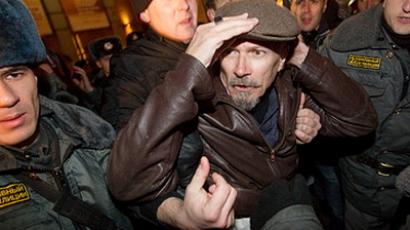US snubbed Russian opposition pleas for help

Russian opposition leaders and human rights activists pleaded with top US officials to support their plans for political and social change, but the request was apparently given short-shrift by Washington.
Russia's Komsomolskaya Pravda newspaper, which obtained fresh files from WikiLeaks, reports that the group was consistently critical of the Kremlin and wanted American help for reform. The members of the opposition accused the US leadership of turning a blind eye to observance of human rights in Russia while at the same time seeking financial aid from America and even demanding US ideological involvement in their activities.Those demands were voiced on a visit to Moscow by Michael McFaul, Special Assistant to The President for National Security Affairs and senior director of Russian and Eurasian Affairs at the United States National Security Council. He met with opposition leaders at the residence of the American envoy to Russia in Moscow.
Read Gleb Pavlovsky on the issue here
The opposition asked the US to be more critical of civil rights violations taking place in Russia, but not “Bush-like critical”.Those who were present at such meetings at the US embassy in Moscow also showed some evolution of their opinions over the years. Previously, during George W. Bush’s presidency, they asked the US for softer criticism towards Russia, but these days it is a different story. They seem to believe that there is a lack of harsh critics of Russian policies on America’s part. They even proposed discussing Russia’s internal affairs in the format of representatives from the Russian and American governments and Russian NGOs, but Michael McFaul rejected the idea.According to the reports, the opposition said: “Washington should pay more attention to significant incidents related to freedom of assembly in Russia. To solve problems in Russia's civic society, parties should sit down at the negotiation table – both Russian and US governments, and representatives from NGOs.”The US’ response was, “It is up to Russian activists to build up their relations with their administration, without relying on America.”Leaders of the Russian opposition also believe that the recent reset of Russia-US relations has had a negative influence on human rights in Russia. Activists, especially in the North Caucasus, have been saying that after the murder of Natalya Estemirova in 2009 the head of Chechnya, Ramzan Kadyrov, was given a “carte-blanche for other murders” and should be recognized as a persona non-grata by the US. Michael McFaul answered that he does not see that happening and said the US would never turn a blind eye on human rights violations in domestic issues in Russia and would express its concerns out loud.The report prepared by John Beyrle, the American ambassador to Russia, concluded that the opposition in Russia is unsustainable and immature. He also reported that some members of the opposition asked for American help in registering new political parties. The ambassador also reported that the opposition sees the possibility of Vladimir Putin once again running for presidency as the biggest threat to Russia-US relations and that America should be involved to prevent that from happening. Michael McFaul rejected the idea of American involvement in such activities altogether.Oppostion: “To further improve relations between Russia and the US, the Obama administration has ostensibly refrained from vocal support for democratic reform.”US: “Civil society activists in Russia are unaware of the contours of the US approach to human rights and its record of public statements and speeches. Russia's 'democrats' remain in near-terminal disarray – constant personality disputes, disagreements with the Kremlin, differences over the viability of political activity.”In his report to Washington, ambassador John Beyrle proposed that the US should make its position on human rights issues and democracy in Russia more clear to the members of the Russian opposition and explain to what extent the US is willing to be involved in Russia’s domestic issues.
Michel Chossudovsky from the Center for Research on Globalization said it is no surprise that Russian opposition parties come knocking on the door of the US embassy.“The involvement of US officials with opposition parties against the Russian government should come as no surprise. The Russian government is a government which states its point of view. If the United States doesn’t like this point of view, it will attempt to weaken or destabilize the existing government – or [push for] regime change as it has in countries around the world. And how does it undertake regime change?They establish links with opposition political parties, and of course these opposition groups are often financed directly by US foundations, including the National Endowment for Democracy and Freedom House. The National Endowment for Democracy is really an outgrowth of the CIA.”
John Laughland, director of studies at the Institute of Democracy and Cooperation, believes that the parliamentary opposition in Russia does not have enough support in the country and that is why they are seeking help elsewhere.“[WikiLeaks] documents show frustration on the part of these groups with the new Obama foreign policy – the “reset,” he said. “These opposition leaders and NGO leaders are going to the Americans and saying that they don’t feel the denunciation is active enough. They are the ones asking for more and the Americans, in these documents at least, are being slightly reserved and saying that in fact they are already doing as much as they can.”
Investigative journalist Webster Tarpley believes that the Russian opposition needs to retool, to get some actual positive ideas, and not simply be the “long arm” of a foreign power.“You look at that opposition and you seem to think, ‘what do they stand for?’ They seem to be a group of people who are only united by their hatred of Prime Minister Putin. ‘De-Putinization’ is the only thing they have to offer. They seem to wait around for murders to occur and then blame it on Putin – a kind of knee-jerk reaction,” he said. “I don’t see an economic program, I don’t see anything constructive, I don’t see anything that could help the future of a great nation. So therefore I don’t see why people would be interested.”













